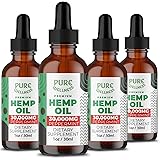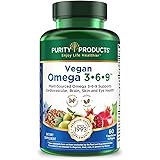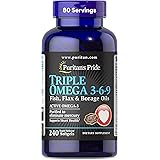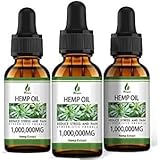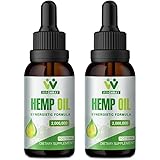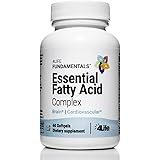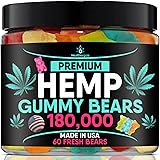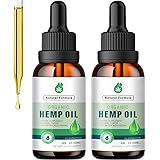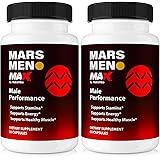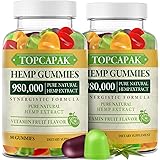Have you ever found yourself navigating the perplexing world of skincare, searching for a natural solution to calm your irritated, sensitive skin, only to be met with confusing claims and unfamiliar ingredients? Perhaps you’ve heard whispers of “hemp oil” but immediately dismissed it, conjuring images of something illicit or “woo-woo.” If so, you’re not alone. Many individuals are understandably hesitant when the word “hemp” comes up, often conflating it with substances that have psychoactive effects. However, as the insightful video above explains, the truth about hemp seed oil for sensitive skin is far from these misconceptions, revealing a powerful ally in your quest for healthier, calmer skin.
This article delves deeper into the compelling world of hemp seed oil, expanding on the video’s crucial information. We’ll explore why this remarkable oil deserves a prime spot in your wellness toolkit, uncovering its unique properties and how it interacts with your body to foster balance and alleviate discomfort. Prepare to shed old notions and embrace the science-backed benefits of hemp seed oil for both topical application and dietary inclusion, especially for those battling dryness, rashes, and persistent itchiness.
Understanding Hemp Seed Oil: What It Is (And Isn’t)
One of the biggest hurdles for people considering hemp seed oil is overcoming persistent myths. Let’s be clear: hemp oil for sensitive skin is not going to get you “high” or impair your judgment. It is distinctly different from CBD, cannabis, and certainly from products containing high levels of tetrahydrocannabinol (THC), the psychoactive compound. The FDA generally recognizes hemp seeds and hemp seed oil as safe (GRAS), which is why you can readily find them in grocery stores and skincare products across the country.
Hemp seed oil is extracted from a specific strain of the Cannabis Sativa plant, meticulously cultivated to contain negligible amounts of THC. This means you gain all the beneficial plant compounds without any mind-altering effects. This distinction is vital for anyone hesitant to try hemp-based products due to historical misassociations. It’s time to let go of these outdated notions and embrace the genuine potential of this plant-derived powerhouse for improving your skin health.
The Nutritional Powerhouse: Omega Fatty Acids and Protein
Beyond its non-psychoactive nature, hemp seed oil is celebrated for its rich nutritional profile, particularly its abundance of omega fatty acids. These essential fats, including omega-3 and omega-6, are crucial for overall health but cannot be produced by the body; they must be obtained through diet. When applied topically, these omegas contribute significantly to the skin’s barrier function, helping to lock in moisture and protect against environmental aggressors.
Furthermore, hemp seeds, often sold as “hemp hearts,” offer a complete protein profile, meaning they contain all nine essential amino acids. Just three tablespoons of hemp seeds provide approximately 10 grams of protein, making them an excellent plant-based boost for smoothies, salads, or even cooked dishes. This internal nourishment can synergistically support skin health, as a well-nourished body is better equipped to manage inflammation and maintain skin integrity.
How Hemp Interacts with Your Endocannabinoid System for Skin Health
To truly appreciate the benefits of hemp seed oil, particularly its anti-inflammatory properties, we need to understand a fascinating biological system: the Endocannabinoid System (ECS). Discovered less than 50 years ago, this complex network is present throughout your entire body and plays a pivotal role in maintaining homeostasis, which is the internal balance and stability crucial for optimal health. The ECS influences numerous bodily functions, including sleep, memory, mood, digestion, pain sensation, and, most importantly for our discussion, inflammation.
Your body naturally produces its own cannabinoids, called endocannabinoids, to communicate within this system. Scientists have identified at least two primary endocannabinoids: N-arachidonoylethanolamine (AEA) and 2-arachidonoyl glycerol (2-AG), the latter of which is even found in breast milk and contributes to immune health and mood regulation. Hemp, along with other plants, produces compounds known as phytocannabinoids. These phytocannabinoids can interact with your body’s endocannabinoid receptors, thereby influencing the ECS and potentially helping to regulate inflammatory responses and promote overall balance. This intricate interaction is a key reason for the growing interest in hemp and its relatives over the past decade.
Clinical Evidence for Hemp Seed Oil’s Efficacy
The scientific community has been actively researching the benefits of hemp oil, especially for inflammatory skin conditions. For instance, Dr. Peter Leo, a renowned expert, has consistently highlighted the potential of hemp oil for patients suffering from eczema (atopic dermatitis) in various presentations, including at the Eczema Expo 2024 hosted by the National Eczema Association.
A notable 20-week randomized, single-blind crossover study, focusing on atopic dermatitis patients, provided compelling evidence. Participants who orally supplemented with hemp oil daily experienced significant improvements. At the conclusion of the five-month period, researchers observed a reduction in both skin dryness and itchiness. This positive outcome was attributed to a decrease in moisture loss through the skin barrier, alongside a documented reduction in the amount of topical medication these patients needed to use. Moreover, Dr. Leo shared that another endocannabinoid substance, palmitoylethanolamide (PEA), which can be influenced by hemp, has demonstrated anti-itch properties and, according to his slides, can “reduce weekly topical steroid use by 62%.” While PEA as a topical cream is currently challenging to find in the US, its documented benefits underscore the profound potential of these natural compounds for soothing compromised skin.
Integrating Hemp Seed Oil into Your Routine
Given its dual benefits for both nutrition and skincare, incorporating hemp seed oil into your daily life can be surprisingly simple. Whether you prefer to consume it orally or apply it topically, there are several effective ways to experience its advantages.
Dietary Inclusion: Nourishing from Within
Hemp seeds, or hemp hearts, are remarkably versatile in the kitchen. With their mild, nutty flavor and heat-stable nature, they can be added to both cold and hot dishes. Sprinkle them over salads for a textural crunch, blend them into your morning smoothie for an extra protein boost, or stir them into yogurt and granola. To preserve their freshness and beneficial fats, always store hemp seeds in the refrigerator. Additionally, hemp seed oil, also possessing a nutty flavor, can be drizzled as a finishing oil over meals. It’s generally recommended for cold applications rather than cooking, to best maintain its delicate nutritional compounds.
Topical Application: Calming Irritated Skin
When used on the skin, hemp seed oil typically has a slightly grassy aroma and a beautiful yellowish-green hue, which can impart a subtle tint to finished products. Regardless of whether it’s for consumption or topical use, always store hemp oil in a dark glass or plastic container to protect it from light, which can cause oxidation and premature rancidity. For those with sensitive or rash-prone skin, choosing the right topical hemp product is paramount. It is crucial to scrutinize the full ingredient list to ensure it is “skin rash friendly.”
Ingredients to Avoid for Sensitive Skin:
- Menthol and Camphor: These are common in many hemp and CBD products, especially those marketed for muscle pain. However, for compromised skin prone to rashes, these ingredients can be highly irritating and counterproductive. They create a strong cooling sensation that can exacerbate sensitivity and inflammation.
- Peppermint or Spearmint: Any ingredient derived from mint is generally associated with menthol and should be avoided for delicate, rash-prone skin. While these can provide relief for stiff joints or sore muscles, they are unsuitable for a compromised skin barrier.
Seeking out formulations specifically designed for sensitive skin, free from these common irritants, is key. Products that prioritize gentle, soothing ingredients alongside hemp oil can provide significant relief for angry, dry, or cracked skin. Such formulations often act as an oily salve, perfect for locking in moisture after other skincare steps, offering a clean alternative to petroleum- or lanolin-based products. Embrace the potential of hemp seed oil for sensitive skin by making informed choices about the products you use.


